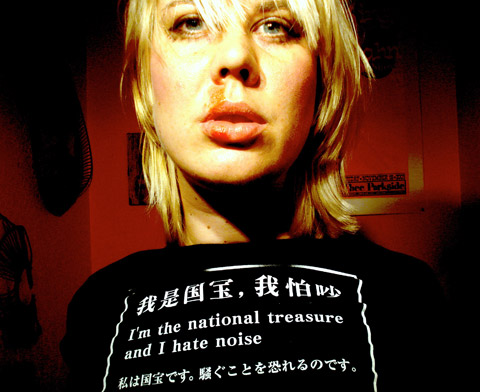
DEEP DAKOTA “I’m always fairly rebellious: if I see a rule, I want to break it,” explains Erika M. Anderson, a/k/a EMA. |
It's a paradoxical yet undeniable truth: sometimes in order to rise above, you need to bottom out. Erika M. Anderson, now doing business as EMA, could be a poster child for the phenomenon. "I think hitting rock bottom is a good thing for many people in life, myself included," she opines blithely. "In some ways, the sooner the better."For Anderson, rock bottom came with the demise in early 2010 of Gowns. The eerily strange band's moderate indie success had uprooted Anderson from the Sioux Falls, South Dakota, noise scene — where she crawled on floors with bands like Man Hater and Swamp Pussy — to Los Angeles, where Gowns evolved and devolved into a musical and psychic exploration of love, pain, and tragedy. Though they produced only one lone long-player, 2007's Red State, Gowns' journey was epic in its own fashion: Anderson and co-conspirator Ezra Buchla were like the nameless couple in Antonioni's Zabriskie Point, going out into the desert to blow their own minds.
Place has always been important to Anderson's music. Listening to Gowns, South Dakota's influence was in more than just the Red State album title. "The sky is huge there," Anderson explains, "and you get huge thunderstorms and lighting. We always wanted huge sounds, just huge everything." But when Gowns ended, she was in a different place in every sense. "I was living in Oakland and substitute teaching, and the way that hip-hop is coming out of every window and every car — after a while, it was like I could hear it finally and start to make sense of it. Before, I could hear it, but I didn't get it, I couldn't penetrate it." From this eureka moment, her new sound started to take shape: electronic percussion and a vague hip-hop influence to mix in with her haunting, confessional aesthetic.
In a sense, being a teacher in a new place allowed her to tap into the raw emotions of her noise background for inspiration. "The thing about substitute teaching is that it's this crazy six-hour improv performance to a possibly hostile audience! It was horrible and also really thrilling, because it was so punishing. Being in a noise band, a lot of the times, you'd have technical meltdowns onstage and just have to roll with it, and that experience was helpful to me."
The most jarring result of this culture clash is the centerpiece on her debut, Past Life Martyred Saints (Souterrain Transmissions), the single "California." On the surface, it's a middle finger to her adopted home, where she still lives (the opening line is "Fuck California/You made me boring"), but on closer inspection it's a beat poem set to a dark-pulsed wash of synths and strings, full of fear and bravery, anger and salvation.
"I'm always fairly rebellious: if I see a rule, I want to break it," Anderson explains. "Living in California, I was really liking all this West Coast hip-hop stuff, and I was like, 'Why can't I make a rap ballad?' I can't — but why? I know I'm a Midwest white girl from a noise background, and it's a huge taboo, you know, to touch anything having to do with hip-hop with a 10-foot pole!"